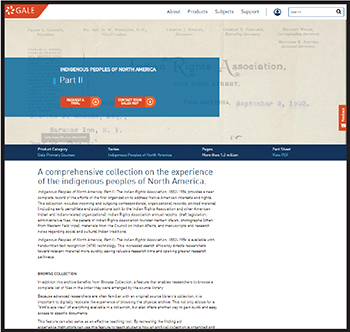Indigenous Peoples of North America, Part II: The Indian Rights Association, 1882–1986 | eReviews
Historians, political scientists, and advanced students will benefit from this collection’s significant and distinctive content as well as the platform’s powerful search and functional design.
 Indienous People of North America, Part II: The indian rights Association, 1882-1986
Indienous People of North America, Part II: The indian rights Association, 1882-1986
CONTENT This latest collection from Gale Primary Sources contains more than 1.2 million digitized pages from the records of the Indian Rights Association (IRA), one of the United States’ earliest organizations seeking to advance the civil rights and welfare of North American Indigenous peoples through an assimilationist approach which itself did harm. Spanning 1882 to 1986 and sourced from the collections of the Historical Society of Pennsylvania, the IRA records hold a sweeping range of material: pamphlets and publications, annual reports, meeting minutes, administrative files, draft legislation, news clippings, photos, correspondence, research notes, manuscripts, and the papers of IRA founder Herbert Welsh. These form Part II of Gale’s Indigenous Peoples of North America series. (Part I was more general coverage of Indigenous peoples.) IRA members documented traditional ways of life of Indigenous peoples in North America, probed government corruption, and shaped U.S. policy by lobbying Congress. The IRA also promoted the removal of Indigenous children from their communities into government boarding schools, thus destroying Indigenous communities. These schools in turn focused on alienating children from their cultural heritage, re-naming them and forbidding Indigenous languages and religions. They also perpetrated other forms of widespread abuse and neglect, the history of which is still being uncovered. Many children died while held in these institutions. The IRA abandoned its assimilationism over time, but this collection does not generally represent the voices of Indigenous people. Rather, these primary sources offer insight into how white American reformers viewed, engaged with, marginalized, and advocated for Indigenous peoples.
USABILITY This digital collection is hosted on the robust Gale Primary Sources platform and is cross-searchable with other Gale digital archives that a given library has licensed. The platform is mobile-responsive and visually appealing. Supplemental materials are lean, shunning the usual sample lesson plans in favor of two short lists of related resources available for free online via the U.S. National Archives. A topic-finder tool creates basic visualizations of connections among search terms and topics in the collection, while a term-frequency tool plots occurrences of search terms by date. Scans are crisp and clear, though the accuracy of Gale’s optical character recognition varies. A content advisory featured on the homepage warns of offensive language and viewpoints in the historical materials. Platform functionality is robust. Researchers can choose from a dazzling array of facet searches, including author, document text and title, publication title and place, and identifier. Researchers can use operators (and/ or/not, proximity, nesting), special characters (quotation marks, wildcards), publication date (exact date or range), document type (minutes, reports, etc.), and other elements. They can search within the full text of individual documents, download PDFs of each item, export citations, and obtain item-level persistent links. They can also browse the collection by archival series, box, and folder.
PRICING Cost varies according to the size and type of the library or institution and the population served. Interested libraries should contact Gale for pricing information specific to their institution.
VERDICT Historians, political scientists, and advanced students will benefit from this collection’s significant and distinctive content as well as the platform’s powerful search and functional design. Hopefully, future collections in Gale’s Indigenous Peoples of North America series will center more voices of Indigenous people.
RELATED
ALREADY A SUBSCRIBER? LOG IN
We are currently offering this content for free. Sign up now to activate your personal profile, where you can save articles for future viewing









Add Comment :-
Comment Policy:
Comment should not be empty !!!